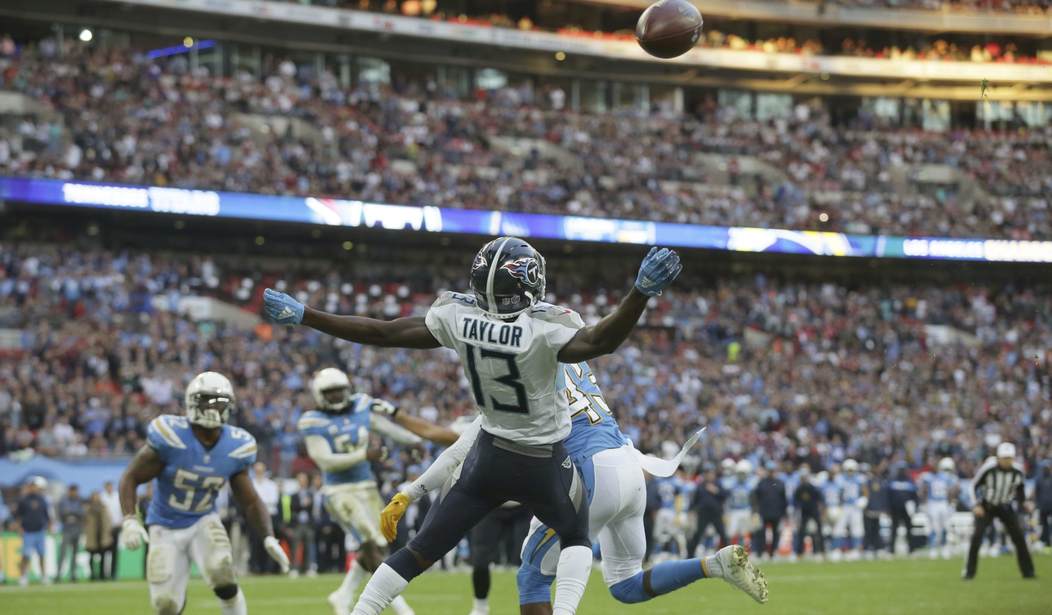This past weekend, the Los Angeles Chargers and Tennessee Titans traveled across the Atlantic to play a game in London’s Wembley Stadium. The Chargers won a thriller when Tennessee scored a touchdown in the last minute of regulation, then failed at a two-point conversion to hand Los Angeles a 20-19 victory. Players spoke of the burdens of traveling so far to play a game, especially the team from California that had to cross eight time zones. Players also spoke out about the tax nightmare they faced when they got to the UK.
The San Diego Union-Tribune (the former hometown paper of record for the Chargers) reported that players talked ahead of time to their CPAs to determine the tax hit they’d take for the privilege of such a long road trip:
Yes, they already are experiencing how playing an NFL game in London can be taxing.
“I am worried,” Virgil Green said. “I’m trying to figure out how my accountant is going to handle this.”
The veteran tight end was talking about actual taxes, you know, the kind the Beatles once sang about?
These overseas ventures can be demanding, physically and financially.
“I’m thinking in terms of tax purposes how this is going to hit me,” Green said. “I’m already getting taxed enough in the state of California, and I’m a California guy.”
Green brings up a point not always recognized by fans. Players and their large salaries are subject to significant taxes depending on the jurisdiction of the game being played.
Great Britain, a rather socialistic nation, levies high taxes on athletes who visit for an athletic match. Teams from California — the Raiders, Chargers, and Rams — already face the highest state income tax in the nation with a top rate of 13.3 percent. Of course, players also have to pay federal income tax. The Tax Cuts and Jobs Act reduced the top marginal federal rate to a healthy 37 percent, down from 39.6 percent. To top it all off, those players who receive one of their 16 paychecks in London pay a 45 percent tax on a prorated amount based on the number of days they spend in the country.
Bottom line: Players on California teams could end up paying 60 percent or more in income taxes for that game check.
It gets worse. Great Britain’s visiting athlete rule has garnered so much criticism that notable athletes such as Rafael Nadal and Usain Bolt have restricted their appearances in competitions held there or have refused to attend. For non-resident foreign athletes, HM Revenue and Customs (HMRC) reserves the right to tax not only the income they earn from competing in the match but a portion of any endorsement money they earn worldwide.
The NFL has held regular-season games in London since 2007 in an attempt to open up overseas markets for their future revenue models. Several reports over the years strongly indicate that the NFL would like to expand by locating a team in London.
The logistics of such expansion would cause quite a few problems — travel, scouting, personnel logistics. Throw in the nightmare of an extremely complicated foreign tax code and it seems unlikely that any pro football player would want to play half their games in London.
Sure, these guys get paid millions of dollars to play a game on TV for a living. It’s hard to sympathize with their plight. They get paid so much that it seems like Monopoly money.
Nonetheless, these elite athletes make decisions the same way you and I would. Many NBA and NFL free agents already choose their next team based on the tax structure in the state in which that team resides. Many states have a “jock tax” levied on their game checks based on how many days per year they train and compete in the state in which they play. It’s big money for states and CPAs alike. Athletes must hire a good accountant who can navigate the morass of a seemingly endless tax trail based on the team’s travel schedule.
Take the example of David Carr, quarterback for the Raiders. The Raiders have announced their intention to move to Las Vegas from Oakland in a couple of years. Carr makes roughly $25 million annually. Nevada has no state income tax, while, as previously mentioned, California’s top rate of 13.3 percent is the highest in the nation. That translates to a little over $3 million PER YEAR that Carr will save when he blows town with his team.
The freedom of mobility manifests itself in all sorts of ways. A friend of mine moved from Portland to Reno a few years ago and absolved himself of Oregon’s 9.5 percent income tax. Even on a normal salary that’s a significant savings of hundreds of dollars per month.
Then again, the NFL averages over 80,000 butts in the seats when they hold a game in London, so it will probably even out over time. Should they ever place a team in the UK, however, expect lots of players to complain about a whole host of issues, including their taxes.










Join the conversation as a VIP Member